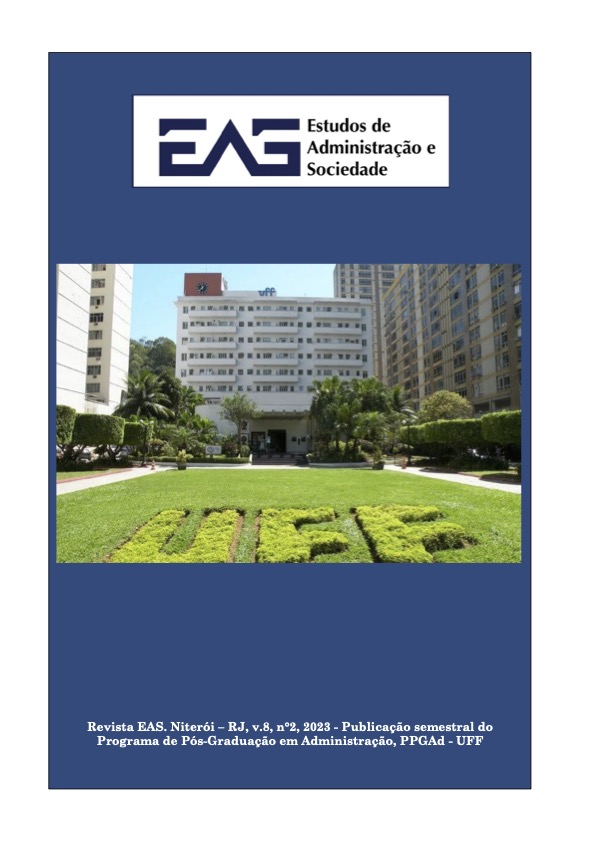Arrecadação de Recursos das Entidades do Terceiro Setor na Região Sul do Brasil:
Análise da Variável Contingencial Tecnologia
DOI:
https://doi.org/10.22409/eas.v8i2.58168Resumo
A captação de recursos é um dos principais desafios enfrentados pelas organizações do Terceiro Setor. Uma das teorias que busca compreender o comportamento organizacional em relação a diferentes estruturas e ambiente é a chamada teoria da contingência, que tem como premissa de que não existe uma única e melhor maneira de organizar, mas sim uma forma apropriada para cada situação técnica. Dentro desta perspectiva, esta pesquisa buscou à luz da Teoria da Contingência responder a seguinte questão: Qual a correlação entre a variável contingencial tecnologia e a arrecadação de recursos das Entidades do Terceiro Setor na região Sul do Brasil? Para responder a esta problemática, foi realizado um levantamento de todas as entidades do Paraná, Santa Catarina e Rio Grande do Sul cadastradas como OSCIPS- Organização da Sociedade Civil no Mistério da Justiça para envio de um questionário adaptado de Schulz (2014). A pesquisa é caracterizada como uma pesquisa de campo, descritiva, com abordagem quanti-qualitativo, sendo aplicado o estudo de correlação (teste t de Student) para variáveis quantitativas (grau de tecnologia e de arrecadação) e o estudo de associação (teste Qui-Quadrado) para variáveis qualitativas (a percepção da entidade quanto ao uso das tecnologias). Por meio desse estudo, foi constatado que existe uma correlação positiva, embora fraca, da tecnologia com a arrecadação de recursos, tendo maior influência para a captação de recursos a forma com que a entidade executa a sua prestação de contas para a sociedade.
Downloads
Referências
Burns, T., Stalker, G. (1961). The management of innovations. London: Tavistock.
Camargo, M. F. (2001). Gestão do terceiro setor no Brasil. São Paulo: Futura.
Chandler, A. D. (1962). Strategy and structure – chapters in the history of American industrial enterprise. Cambridge: MIT Press.
Chendall, R. H. (2003). Management control systems design within its organizational context: findings from contingency-based research and directions for the future. Accounting, Organizations and Society, v. 28, n. 2-3, p. 127-168, Fev./abr. Disponível em http://citeseerx.ist.psu.edu/viewdoc/download?doi=10.1.1.475.4352&rep=rep1&type=pdf. Acesso em: 02 jul. 2020.
Chiavenato, I. (2003). Introdução à teoria geral da administração: uma visão abrangente da moderna administração das organizações. 7. Ed. Rio de Janeiro: Elsevier.
Fagundes, J. A., Petri M., Lavarda, R. B., Rodrigues, M. R., Lavarda, C. E. F., Soller, C. C. (2010). Estrutura Organizacional e gestão sob a ótica da teoria da contingência. Gestão & Regionalidade. Disponível em: https://doi.org/10.13037/gr.vol26n78.792. Acesso em 02 nov. 2019.
Gil, Antônio Carlos. (2002). Como elaborar projetas de pesquisas - 4. ed. - São Paulo: Atlas.
Lawrence, P. R., Lorsch, J. W. (1976). Organization and environment. Managing differentiation and integration Boston: Harvard University Press, 1967.Versión castellana: Organización y ambiente. Barcelona: Labor.
Lima, M. D. X. (2018). Um estudo sobre a Influência dos Níveis de Overhead na Captação de Recursos de Entidades do Terceiro Setor. Dissertação (Mestrado em Ciências Contábeis). Universidade Federal de Pernambuco, Recife. Disponível em: https://repositorio.ufpe.br/handle/123456789/31721. Acesso em 10 jul. 2020.
Lopes, L. F. D. (2016). Métodos Quantitativos. Santa Maria: Universidade Federal de Santa Maria.
Matos, E. R. J.(2010). Perfil do sistema de controle gerencial sob a perspectiva da teoria da contingência. Tese (Doutorado em Controladoria e Contabilidade: Contabilidade) - Faculdade de Economia, Administração e Contabilidade, Universidade de São Paulo, São Paulo, doi:10.11606/T.12.2010.tde-10052010-143511. Acesso em: 05 jul. 2020
Marconi, M. A., Lakatos, E. M. (2002). Técnicas de pesquisa. 5. ed. São Paulo: Atlas.
Milani Filho, M. A. F., Corrar, L., Martins G. A. (2009). O voluntariado nas entidades filantrópicas paulistanas: O valor não registrado contabilmente. Revista Contabilidade, Gestão e Governança. Disponível em: <https://www.revistacgg.org/contabil/article/view/200>. Acesso em: 05 jul. 2020.
Morgan, G.(2007). Imagens da organização. 2. Ed. São Paulo: Atlas.
Olak, P. A., Nascimento, D. T. (2010). Contabilidade para entidades sem fins lucrativos (Terceiro Setor). 3. ed. São Paulo: Atlas.
Perrow, C. (1976). Organizational analysis: a sociological view. Califórnia: Wadsworth Publishing Company.
Santos, Y. C., Negrão, K. R. M., Saboya, S. M. P. (2018). Estratégias para Captação de Recursos no Terceiro Setor: Um estudo Multicaso Aplicado na APAE Belém e APAE Barcarena. Revista de Administração e Contabilidade - RAC, [S.l.], v. 5, n. 10, p. 175-213, dez. 2018. Disponível em: <http://revistasfap.com/ojs3/index.php/rac/article/view/236>. Acesso em: 02 jul. 2020.
Souza, K. R., Kerbauy, M. T. M. (2017). Abordagem quanti-qualitativa: Superação da dicotomia quantitativa-qualitativa na pesquisa em educação. Revista Educação e Filosofia. V.31. n.61 p. 21-44. Disponível em: DOI: http://dx.doi.org/10.14393/REVEDFIL.issn.0102-6801.v31n61a2017-p21a44. Acesso em: 10 jul. 2020.
Schulz, S. J. (2014). Relação entre variáveis contingenciais, profissionalização e aprendizagem organizacional em Entidades do Terceiro Setor. Dissertação (Mestrado em Ciências Contábeis) - Fundação Universidade Regional de Blumenau, Blumenau.
Tenório, F. G. (2008). Gestão comunitária: uma abordagem prática. Rio de Janeiro: FVG, 2008.
Woodward, J. (1958). Management and technology. London: H. M. Stationary Office.
Downloads
Publicado
Edição
Seção
Licença
Copyright (c) 2023 Estudos de Administração e Sociedade

Este trabalho está licenciado sob uma licença Creative Commons Attribution 4.0 International License.
Autores que publicam nesta revista concordam com os seguintes termos:
- Autores mantém os direitos autorais e concedem à revista o direito de primeira publicação, com o trabalho simultaneamente licenciado sob a Licença Creative Commons Attribution que permite o compartilhamento do trabalho com reconhecimento da autoria e publicação inicial nesta revista.
- Autores têm autorização para assumir contratos adicionais separadamente, para distribuição não-exclusiva da versão do trabalho publicada nesta revista (ex.: publicar em repositório institucional ou como capítulo de livro), com reconhecimento de autoria e publicação inicial nesta revista.
- Autores têm permissão e são estimulados a publicar e distribuir seu trabalho online (ex.: em repositórios institucionais ou na sua página pessoal) a qualquer ponto antes ou durante o processo editorial, já que isso pode gerar alterações produtivas, bem como aumentar o impacto e a citação do trabalho publicado (Veja O Efeito do Acesso Livre).

